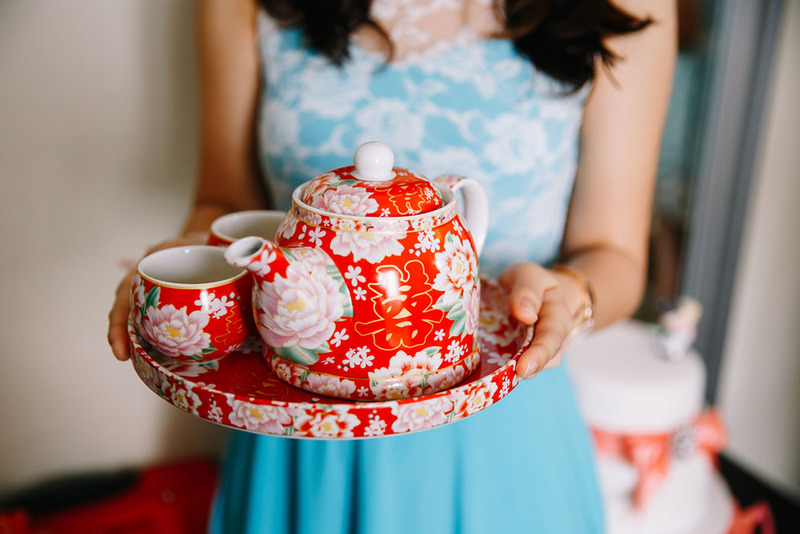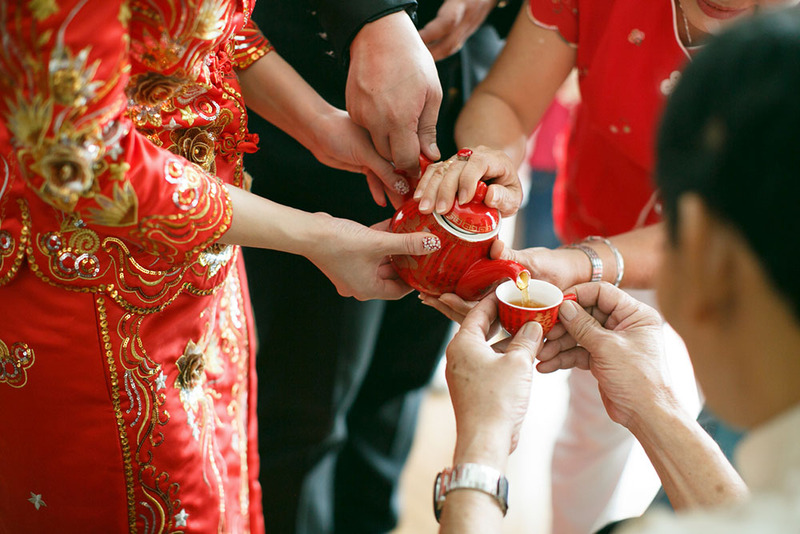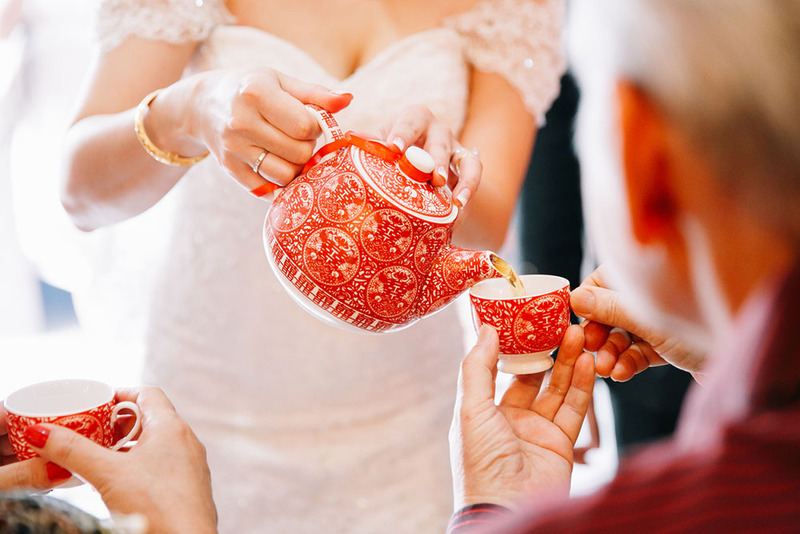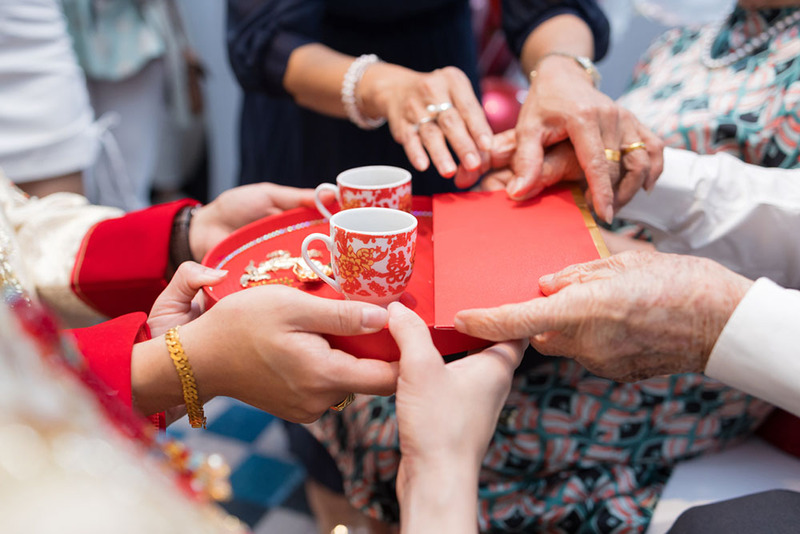AMERICAN WEDDINGS BLOG
Stay up to date with the latest wedding ceremony trends, script writing inspiration, tips and advice for first-time officiants, and news that matters to couples and wedding ministers.
Stay up to date with the latest wedding ceremony trends, script writing inspiration, tips and advice for first-time officiants, and news that matters to couples and wedding ministers.
Published Thursday, Nov. 21st, 2024
Last updated Tuesday, Dec. 17th, 2024

Traditional Chinese weddings are colorful and festive, with bursts of red and gold clothing and decor, and many friends and family gathered together to wish the couple a long and prosperous marriage.
The Chinese tea ceremony wedding tradition is very old – more than 1,000 years old! One of the earliest recorded tea ceremonies was in 641 AD, when Tang Princess Wencheng married the Tibetan Emperor Songtsen Gampo, and it’s been a part of Chinese weddings ever since.
Related: Red Wedding Dresses: Symbolism and Modern Meanings
This long history makes the tea ceremony a beautiful way to honor your culture on the wedding day, and to show your deep appreciation and love for your parents, family, and friends. If you’re an intercultural couple, you can even personalize the tea ceremony with aspects from both of your cultures.
Below, you will find useful advice on how to plan a Chinese wedding tea ceremony. We compare the traditional Chinese tea ceremony with modern options, with lots of room to personalize your celebration. We hope it inspires you!

What is a Chinese wedding tea ceremony & how can you add this tradition to you wedding day? Keep reading for answers to common questions and inspiration to help you start planning! (Photo: hxyume / iStock)
Modern options for when to host your wedding tea ceremony:
Traditionally, this special Chinese wedding tradition takes place privately on the day of the wedding, in the morning before the formal marriage ceremony.
These days, you have more flexibility in the timing of your tea ceremony. If you choose to spread your wedding festivities out over a long weekend, you might plan your tea ceremony for the day before the wedding, as a late-morning or afternoon gathering with family, or host it during your wedding reception or cocktail hour so that friends can watch after the formal marriage ceremony.
Related: How long is a wedding ceremony? What to Include and What to Skip
Spreading the celebration out over a few days gives you more time to spend with your closest family members (something extra special if relatives traveled a long distance to be there). But many couples still prefer their tea ceremony on the morning of the wedding day as an opportunity to spend a quiet moment with family before the public party. It’s up to you!
A traditional Chinese tea ceremony would go like this: The engaged couple arrive in their traditional Chinese wedding attire (a cheongsam, qipao, or Qun Kwa for brides; and the changshan and Tang Suit for grooms). The couple are joined by the groom’s parents, who sit in two comfortable chairs. The couple makes a pot of tea (traditionally oolong, black, or fermented pu-erh tea) and serves the tea to the groom’s parents. After the elders sip the tea, they pass the cups to a friend and give the couple wedding gifts of money or jewelry to wish them happiness and abundance in marriage.
During a modern Chinese tea ceremony, couples usually include both sets of parents and grandparents in this tradition, as well as other beloved family elders: stepparents or foster parents, aunts, uncles, grandaunts and granduncles, and so on!
In modern ceremonies, everyone present takes a turn sitting in the two chairs and is served tea by the couple. Each guest presents the couple with small monetary gifts in red envelopes as a token of love and well-wishes. A beloved relative is usually there to take the cups of tea after they are sipped, to keep the celebration a little more organized.
(You might also start with grandparents; for LGBTQ+ couples, you can start with either partner’s parents / grandparents; single elders can also participate using only one chair)
(Pass these elders cups of tea, and so on)

Compare traditional and modern variations of the Chinese wedding tea ceremony to plan your perfect celebration with friends and family. (Photo: hxyume / iStock)
As you can see from the descriptions above, a Chinese wedding tea ceremony can last anywhere from 30 minutes to 2 hours or more depending on the size. The length of your tea ceremony will depend on your personal preferences and how many family members you invite.
We recommend you set aside 1 hour to host 20 or fewer participants, with an additional hour planned for every additional 20 participants. (For example, if 100 relatives are joining in, your tea ceremony could last 4 or 5 hours! You’ll definitely need more than one pot of tea…)
Where should you host a tea ceremony? This depends on several factors, including when you want to host it, how many people you invite, and your wedding budget. Ultimately this decision is up to you and your families. Here are a few suggestions to consider:
If you are inviting a large group of relatives and have a larger wedding budget, consider hosting your wedding tea ceremony at a local tea shop, cafe, hotel, or restaurant. This will ensure you have lots of supplies on hand, plenty of seating for everyone, and will make the clean-up easier.
If the tea ceremony is right before your wedding, you might choose to host it at your wedding venue. This decision will depend on the venue’s available space, your rental time and cost, supplies and amenities, and other factors.
Related: A Simple Wedding Planning Checklist & Timeline for Busy Couples
If you have a smaller gathering planned or are on a tighter budget, a DIY home Chinese tea ceremony might work best. Traditionally, this private gathering would take place at a groom’s parents’ home, but you can host it anywhere you choose: in your own home, a friend’s home, a family backyard or garden, a neighborhood park, and so on.
If your tea ceremony takes place after the formal wedding during a cocktail or wedding reception, you will probably host it at the venue. Let your venue know your plans ahead of time for a low-stress celebration!
Speaking of supplies, what items do you need for a Chinese tea ceremony? Tea, of course! But what else? You can stick with the basics, or make your ceremony more elaborate depending on your tastes, and your venue might provide some items for you. The list below is a good starting point.
(Traditional choices include loose-leaf oolong, black, or fermented pu-erh tea, but you can pick any kind of tea you like.)
(This can be prepared in an electric urn, on the stovetop, or carried to your venue in a carafe depending on your needs.)
(Order a lucky red Chinese wedding tea set just for the occasion, use a family heirloom tea set, or keep it simple with a cute mismatched tea set and cups from home.)
(This is traditionally an older married woman in your family, but you can choose anyone you like.)

You can wear traditional or modern wedding attire during your tea ceremony -- it's up to you! (Photo: hxyume / iStock)
If you’re an intercultural couple, you might wear traditional wedding attire that reflects each of your cultures, or you might both wear traditional Chinese wedding garments to honor the long history of the tea ceremony.
If the tea ceremony follows your formal wedding, you might be dressed in suits or gowns, or you might change into a second wedding look to prepare for cocktail hour.
And if your tea ceremony is the day before the wedding, you might wear something semi-formal (fashionable but comfortable!) to show your respect for the occasion and your loved ones.
Related: What Does a Wedding Officiant Wear?!
Guests should remember that the Chinese tea ceremony wedding tradition is very special, so it’s generally better to overdress than to underdress. A semi-formal outfit, such as a well fitting suit, modest dress, or stylish long skirt and blouse, is usually suitable. Be sure to follow the couple’s wedding dress code if the ceremony takes place during the reception.
Do you bring a gift to a tea ceremony? In general, yes, it’s better to bring a small gift for the couple than not to. If you’re not participating in the tea ceremony (and are just there as a guest to watch), you might bring an item from the gift registry or handwritten card.
If you’ve been invited to participate in the tea ceremony, you should prepare a small gift to hand to the couple when it’s your turn. The traditional gift is money, placed into a red envelope, which you’ll hand to the couple after taking a sip of the tea they hand you. Only place cash in the envelope, never coins, and crisp new bills are best.
Close relatives, such as the couple's parents or grandparents, sometimes give jewelry as a gift instead of money.
Related: Read about a traditional Chinese Golden Pig Necklace wedding gift
How much money you put in a red envelope for the tea ceremony will depend on your relationship with the couple and your budget. In general, distant relatives usually give about $100 and close relatives give about $200 to $300. If you are on a restricted or small budget, consider giving a crisp $20 bill in your envelope.
Different regions in China have different traditions for how many red envelopes to give the couple during their ceremony. In some traditions, a pair of relatives will hand the couple two envelopes (one for each of them). In other traditions, a pair of relatives will hand the couple a single envelope to share, as a symbol of their unity. Both of these options are acceptable.

Red envelopes are given as gifts during the tea ceremony as blessing and good wishes for the newlyweds (or soon to weds). The money is in the envelopes is also used to help pay for the wedding and help the couple start their life on good financial footing as married spouses. (Photo: Thai Liang Lim / iStock)
Now that you know the basics of how to plan a wedding tea ceremony, you might want to get creative! The tea ceremony can be as traditional or modern as you wish – making it one of the most special ways to include family and friends in the wedding celebration.
If you’re planning an intercultural or multicultural wedding, you can even personalize your tea ceremony to reflect both (or all) of the cultures in your new family.
Related: Ask a friend to officiate! Interfaith Minister Ordination for Wedding Officiants
For example, you might serve an Indian chai tea to honor both Chinese and Indian wedding traditions during the ceremony. In a Korean Chinese marriage, the bride’s parents might give chestnuts and dates as gifts instead of money, because that’s customary during a Korean paebaek tea ceremony. In a Columbian Chinese wedding, a tea ceremony might be combined with a serenata, with the groom serenading the bride to live music, since friends and family are already gathered together. And so on!
Other ways to honor different cultures during a tea ceremony are by choosing special decor, picking a meaningful venue, using heirloom tea sets or cups, or bringing symbolic chairs for your elders. Consider culturally meaningful music and clothing options as well.
Watch an example of a Chinese wedding tea ceremony here:
Good things happen when friends and relatives help out at the wedding ceremony! Ask a friend or family member to officiate your wedding with free online ordination through American Marriage Ministries (AMM).
|* custom-button, "https://theamm.org/ordination-application", "ORDAINED MINISTER ONLINE APPLICATION" *|
Why AMM? American Marriage Ministries is an inclusive nondenominational internet church that ordains and trains ministers to officiate marriage ceremonies. We are a recognized 501(c)(3) nonprofit church, and help people from all backgrounds and beliefs become ordained ministers for weddings. Our online ordination is free, accessible, and never expires.
Officiating weddings is an incredible honor, and a great way to show your love and support for the people getting married. As a wedding officiant, you will help to create memorable ceremonies and memories that last a lifetime.
AMM Ministers can legally officiate weddings in every state* (it's much harder in Virginia, where we're looking into our options). After getting ordained with AMM, you might need to register your ordination with your local county clerk’s office. Click the link above to get started!

Become an ordained minister online with American Marriage Ministries and officiate wedding for friends and relatives. (Photo cropped: Biserka Stojanovic / iStock)
Love it? Pin it!
Become a Wedding Officiant with Our Free Online Ordination!